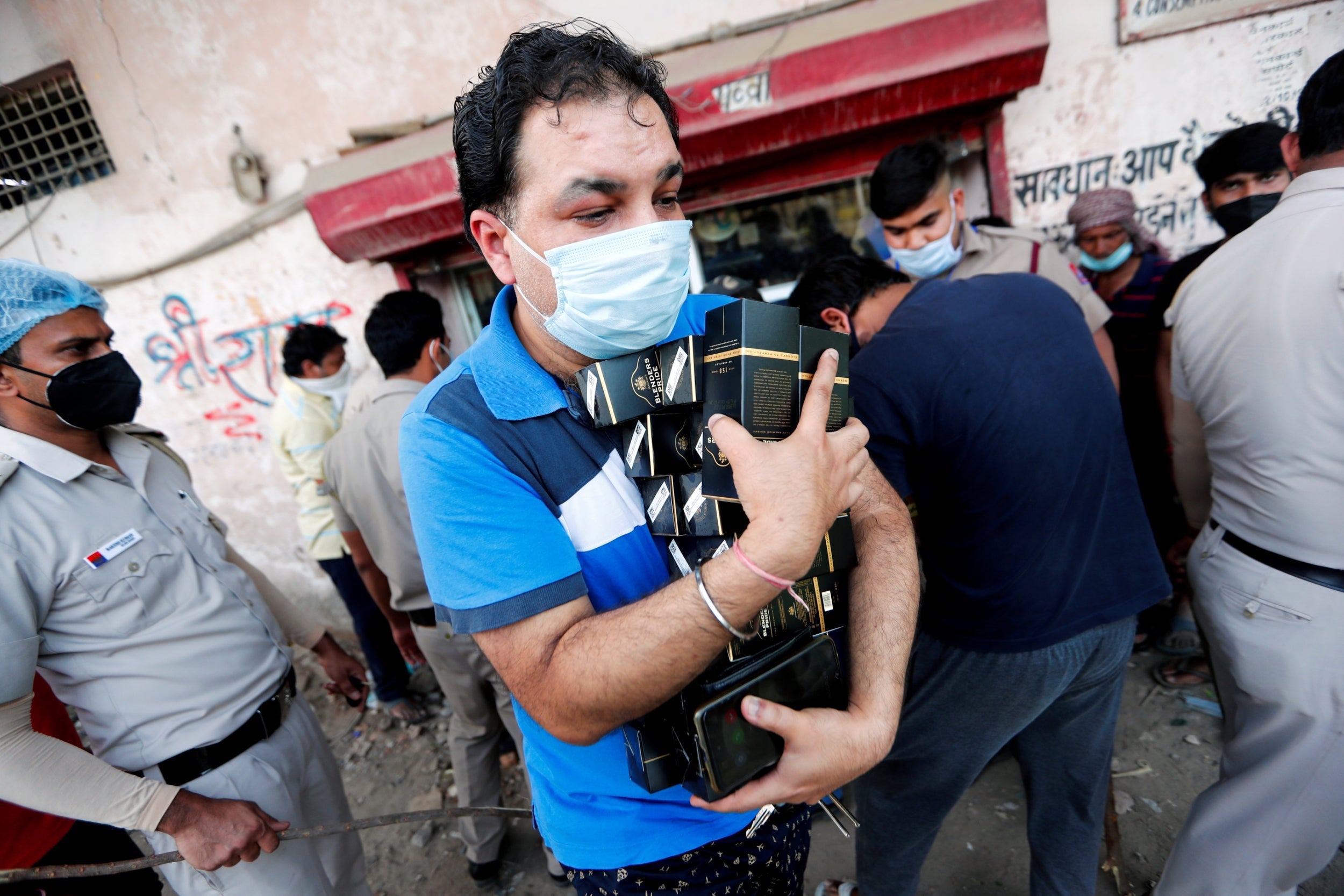India police baton-charge huge crowds as alcohol stores open for the first time since lockdown began
Lockdown gradually eases as government tries to get economy back up and running

Your support helps us to tell the story
From reproductive rights to climate change to Big Tech, The Independent is on the ground when the story is developing. Whether it's investigating the financials of Elon Musk's pro-Trump PAC or producing our latest documentary, 'The A Word', which shines a light on the American women fighting for reproductive rights, we know how important it is to parse out the facts from the messaging.
At such a critical moment in US history, we need reporters on the ground. Your donation allows us to keep sending journalists to speak to both sides of the story.
The Independent is trusted by Americans across the entire political spectrum. And unlike many other quality news outlets, we choose not to lock Americans out of our reporting and analysis with paywalls. We believe quality journalism should be available to everyone, paid for by those who can afford it.
Your support makes all the difference.Indian police were forced to baton-charge crowds outside liquor stores on Monday as the first sales of alcohol were allowed since a national lockdown began almost six weeks ago.
A trickle of activity returned to the streets of Delhi as people were allowed to venture out of their homes for exercise and some non-essential shops were reopened, though many restrictions remain in place.
Shops in large markets or malls are still shuttered, meaning only around 130 licensed “standalone” liquor stores opened – hardly enough to meet demand.
By 9.30am queues of hundreds of people had already started to form outside shops, with posts on social media showing lines of masked customers snaking around buildings in the 35C heat. By midday, #LiquorShops was the top trend on Twitter in India.
A witness told Reuters that more than 500 people were waiting to be served at a store in the Kalyan Puri neighbourhood in the east of the city when the shop had to be closed, and police charged the crowd wielding lathis – wooden sticks – to disperse it.
“The government should just keep the liquor shops shut if such crowds are going to gather,” said Neeraj Mehta, a would-be customer at another store in east Delhi who was put off by the queues.
According to the Associated Press, there were similar scenes at a store in Old Delhi, the crowded central neighbourhood around the city’s Red Fort landmark. More than 200 people were vying to reach the counter when pushing and shoving broke out, and police were forced to break up the crowd.
Delhi, like other metropolises such as Mumbai and Bengaluru, has been designated as a red zone under a new traffic light system for the nationwide lockdown that will be in place from Monday until at least 17 May.
All air traffic, trains and interstate buses remain suspended, and schools, hotels, restaurants, bars, shopping malls, cinemas and places of worship will remain shut regardless of a district’s colour coding.
In urban red zones, offices are being allowed to restart operations with staffing at 33 per cent capacity, and construction projects can resume as long as workers don’t have to travel far to reach the site. Green zones, where there have been no new coronavirus cases recorded for 21 days, will be allowed to resume all activities except those that remain banned nationally.
India has seen more than 42,500 Covid-19 cases so far and 1,300 deaths, numbers which have risen steadily as testing has become more widely available. Experts say the outbreak is yet to peak, although government health officials told a daily briefing on Monday that the country was now seeing cases doubling every 12 days, compared to every 3.4 days before the lockdown began.
State leaders have generally been supportive of the central government’s stance throughout the crisis, and Delhi chief minister Arvind Kejriwal told reporters on Sunday that it was the right time to start opening up the capital. “We have to get prepared to live alongside corona, we have to get used to it,” he said.
Ajay Kumar, a Delhi official in charge of liquor stores, admitted that police were being forced to shut premises after a chaotic first day back in business, but said it was the government’s intention to persevere. “We want to keep the shops open,” he told Reuters.
India’s lockdown, one of the strictest in the world, has taken a heavy toll on the country’s economy, and on no group of people more so than the millions of internal migrant workers who, before the pandemic, had left their villages in search of employment in cities.
The central government has faced mounting pressure to provide more support for these stranded workers, and over the weekend announced a special rail service to take those who wanted to go back to their home villages.
But there was a backlash on Monday after it emerged that the workers would be charge up to 800 rupees (£8.50) for the privilege. A daily manual labourer in India typically earns between 200 and 600 rupees.
The government insisted it was charging a heavily subsidised rate, but the main opposition Congress party called it a “disturbing” development, and its leader Sonia Gandhi said the party would cover the cost “in this hour of crisis”.
Join our commenting forum
Join thought-provoking conversations, follow other Independent readers and see their replies
Comments